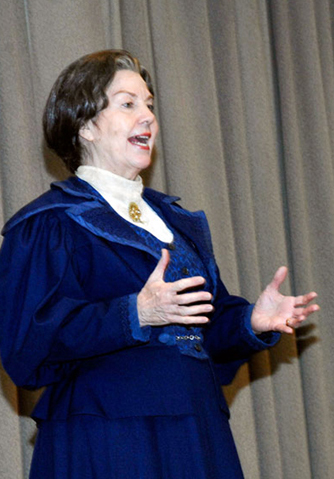
Jane Cox in the role of Carrie Chapman Catt in her one-woman play, The Yellow Rose of Suffrage
Jane Cox, a longtime faculty member at Iowa State University and program director for ISU Theatre, will again take on the role of Carrie Chapman Catt as she performs her one-woman play, The Yellow Rose of Suffrage, to kick off the Catt Center’s 20th anniversary celebration.
The play will be presented in its entirety beginning at 2 p.m. on Sunday, Aug. 26 – which also marks Women’s Equality Day and the 92nd anniversary of the ratification of the 19th Amendment to the U.S. Constitution granting women the right to vote – at the Ames City Auditorium, 515 Clark Avenue. The event is free and open to the public.
Almost two decades ago, the College of Liberal Arts and Sciences commissioned Cox to create a play about the life and times of Catt, one of Iowa State’s most distinguished alumni. An 1880 graduate of Iowa State, Catt devoted 33 years of her life to the women’s suffrage movement. Catt also served twice as president of the National American Woman Suffrage Association, founded of the League of Women Voters, and worked for world peace.
The Yellow Rose of Suffrage tells about Catt’s early life on an Iowa farm in the 1800s and her conviction that women should have the right to vote. As the play moves forward, it concentrates on the suffrage movement and the passing of its leadership role from Susan B. Anthony to Catt in 1900. The play concludes by focusing on Catt’s “winning plan” to achieve suffrage by campaigning for the passage of an amendment to the U.S. Constitution. Intertwined with the suffrage story are glimpses of Catt’s personal life, including the tragic early deaths of her two husbands, which illustrate her ability to persevere.
The play was commissioned as part of the celebration surrounding the renovation of Old Botany and the renaming of the historic building as Carrie Chapman Catt Hall. The Carrie Chapman Catt Center for Women and Politics, which also honors Catt, was founded with the approval of the Iowa Board of Regents on Sept. 23, 1992, and has been located in Catt Hall since its re-opening in 1995.
Since 1993, Cox has performed the play in its entirety or in excerpts more than 150 times. She has traveled throughout the United States performing The Yellow Rose of Suffrage in such locations as New Rochelle, NY, (Catt’s final home); for the Colorado Suffrage Centennial in Denver, CO; at the National Convention of Pi Beta Phi in Anaheim, CA; during the national meeting of the General Federation of Women’s Clubs in Phoenix, AZ; and at the Kennedy Center in Washington, DC.
Much of Cox’s interests reside in researching and writing plays with historical significance, specifically the lives of pioneering women. In order to create The Yellow Rose of Suffrage, Cox conducted extensive research into the life of Catt by analyzing her letters housed in the Library of Congress in Washington, DC, and her speeches located in the New York Public Library. Excerpts of Catt’s letters and speeches are used throughout the play.
“The LAS dean’s office provided funding for me to travel to the Library of Congress as more than 9,000 original documents concerning Catt were housed there,” Cox said. “This was a great experience for me and I will never forget the generosity of former LAS Dean Elizabeth Hoffman in encouraging this project.”
Cox has been involved in more than 250 productions as an actress, designer or director. Her one-woman shows have been performed in more than 20 states as well as at the Kennedy Center and the Smithsonian Institution. She has also written Fields of Endless Days, which starred Ossie Davis and Ruby Dee; A Woman’s Place, concerning the life of suffragist Lucy Stone; and scripts for musical plays on the lives of Clara Schumann, Johannes Brahms and Nadia Boulanger. Her latest one-woman plays are The Promised Land about homesteading in the late 1800s and The Longing to Understand, the story of Barbara McClintock, winner of the Nobel Prize in medicine. Cox has been awarded the LAS Excellence in Artistic Creativity Award and a commendation from Gov. Terry Branstad.
According to Cox, Catt often recited the Victor Hugo quote – “There is one thing stronger than any king or army and that is an idea whose time to move has come” – because she firmly believed that women’s right to vote would eventually be accepted law in the United States.